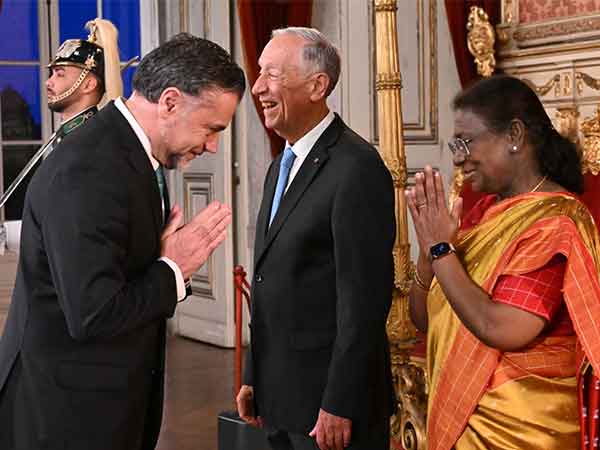US, Japan, South Korea reiterate commitment to trilateral maritime security with international law
Jan 08, 2024

Washington, DC [US], January 8 : The governments of the US, Japan and Korea reiterated their ongoing commitment to trilateral maritime security in accordance with international law with a focus on support for capacity building in the Indo-Pacific region.
They further emphasised the importance of collaborating to enhance regional economic security, resilience, and development, including taking action to combat climate change and engaging with Indo-Pacific partners on several issues, including information and communications technology, cybersecurity, and emerging technology, including through the AI Safety Summit and the Global AI Forum hosted by South Korea in 2024.
"They reiterated their ongoing commitment to trilateral maritime security and law enforcement cooperation in accordance with international law, with a focus on support for capacity building in the region," according to the statement.
The trilateral United States-Japan-Republic of Korea Indo-Pacific Dialogue was held on January 5 in Washington, DC.
This dialogue is a new chapter in the countries' partnership and an important step forward to strengthen and more closely align the policies globally.
It was led by US Assistant Secretary of State for East Asian and Pacific Affairs, Daniel J. Kritenbrink, Japanese Deputy Minister, Director-General Kobe Yasuhiro, and Republic of Korea (ROK) Deputy Minister Chung Byung-won.
Before beginning their planned discussions, the three partners expressed their condolences for those who lost their lives in the recent earthquake in Ishikawa prefecture.
The representatives of the US, Japan, and South Korea discussed each country's Indo-Pacific approach and opportunities for cooperation, with an emphasis on partnership with Southeast Asian and Pacific Island countries.
"They shared their respective assessments on geopolitical trends shaping the Indo-Pacific, highlighting the need for enhanced trilateral cooperation," the statement said.
Moreover, while focusing on the opportunities for cooperation in the Indo-Pacific, the partners also noted the worrying trends in the region, including the worsening humanitarian, political, and economic crisis in Myanmar.
Recalling the publicly announced positions of the three countries on the recent dangerous behaviour supporting unlawful maritime claims by the People's Republic of China in the South China Sea, they strongly reiterated their firm commitment to international law.
Their commitment included "the freedom of navigation and overflight, as reflected in the UN Convention on the Law of the Sea, and they opposed any unilateral attempts to change the status quo by force or coercion anywhere in the waters of the Indo-Pacific."
They further condemned North Korea's continued development of its unlawful nuclear and ballistic missile programs, growing military cooperation with Russia, and grave human rights violations and abuses.
"They reaffirmed the importance of peace and stability across the Taiwan Strait as indispensable to security and prosperity in the international community," it said.
Later, they also reaffirmed their commitment to cooperate through regional forums and groupings, including ASEAN, the Friends of the Mekong, the Partners in the Blue Pacific, and the Pacific Islands Forum.
They further noted the unique opportunity for trilateral cooperation at the United Nations in 2024, while the United States, Japan, and South Korea hold seats on the Security Council.
"They celebrated the success of the US APEC host year in 2023, looked forward to cooperating on the ROK's APEC host year in 2025, and applauded progress made on the Indo-Pacific Economic Framework for Prosperity negotiations," according to the statement.
Moreover, they discussed strategies to advance women's economic empowerment and equitable participation in the digital economy and looked forward to the 2024 Women's Economic Empowerment Conference in Washington, DC.
The ministers also noted the opportunities for further youth engagement with Pacific Island and Southeast Asian countries, supported in tandem by the US, Japan, and South Korea, including the upcoming July 2024 Trilateral Global Leadership Youth Summit in Busan.
Recognizing the increased threat posed by foreign information manipulation, the United States, Japan, and South Korea discussed ways to effectively counter these threats while respecting freedom of expression.
Moreover, the meeting built upon commitments made during the Trilateral Leaders' Summit at Camp David, hosted by President Joseph Biden on August 18 last year.
During the dialogue, the ministers reaffirmed their intent to continue to hold the trilateral dialogue annually and coordinate closely on issues of shared concern in the Indo-Pacific.



















